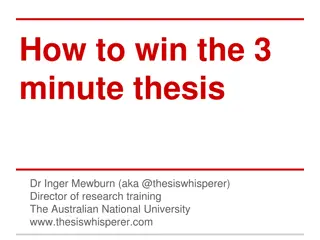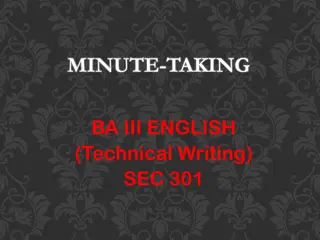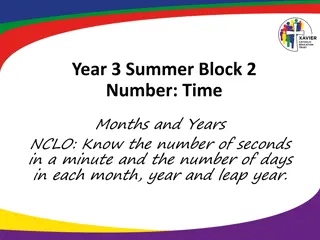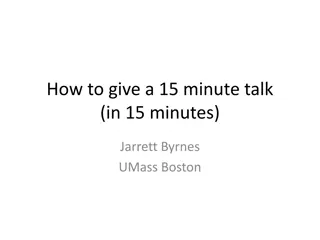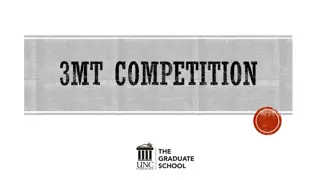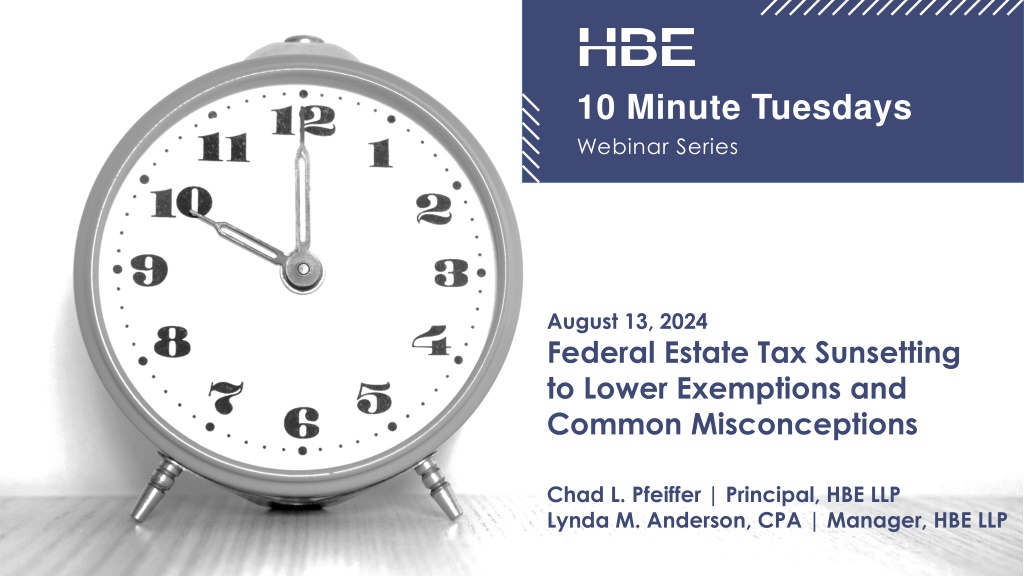
Federal Estate Tax: Changes, Exemptions, and Planning Tips
Learn about the Federal Estate Tax, upcoming changes in exemptions, and common misconceptions in estate planning. Get insights on current laws, exemptions, and practical tips to navigate estate taxation effectively.
Download Presentation

Please find below an Image/Link to download the presentation.
The content on the website is provided AS IS for your information and personal use only. It may not be sold, licensed, or shared on other websites without obtaining consent from the author. If you encounter any issues during the download, it is possible that the publisher has removed the file from their server.
You are allowed to download the files provided on this website for personal or commercial use, subject to the condition that they are used lawfully. All files are the property of their respective owners.
The content on the website is provided AS IS for your information and personal use only. It may not be sold, licensed, or shared on other websites without obtaining consent from the author.
E N D
Presentation Transcript
10 Minute Tuesdays Webinar Series August 13, 2024 Federal Estate Tax Sunsetting to Lower Exemptions and Common Misconceptions Chad L. Pfeiffer | Principal, HBE LLP Lynda M. Anderson, CPA | Manager, HBE LLP
What is the Federal Estate Tax? The federal estate tax is a federal tax imposed on the transfer of a deceased person's property to heirs. As of 2024, the federal estate tax only applies to estates with a value exceeding $13.61 million. The rate exceeding the $13.61 million threshold is 40%. The estate tax is related to the gift tax, which applies to transfers of wealth during a person's lifetime. Both taxes share a unified exemption amount. For instance, large gifts made during a person s lifetime reduce the amount of the estate tax exemption available at death.
What is Currently Happening On January 1, 2026 the current estate tax exemption is scheduled to reset (sunset) to approximately $7,080,000, as adjusted for inflation, unless Congress acts. This is a sharp reduction from the 2024 exemption of $13.61M.
Historical Chart Estate Tax Exemption Estate Tax Exemption Year Top Estate Tax Rate Year Top Estate Tax Rate $1,000,000 50% 2016 $5,450,000 40% 2001 2017 $5,490,000 40% 2009 $3,500,000 45% 2018 $11,180,000 40% No estate tax (temporary repeal) 2010 N/A 2019 $11,400,000 40% 2011 $5,000,000 35% 2020 $11,580,000 40% 2012 $5,120,000 35% 2021 $11,700,000 40% 2013 $5,250,000 40% 2022 $12,060,000 40% 2014 $5,340,000 40% 2023 $12,920,000 40% 2015 $5,430,000 40% 2024 $13,610,000 40%
Estate Tax Illustration Married Taxpayers Current Law Sunsets 12/31/25 Forecast Changes for 1/1/2026 Date of Deaths (both in same year) 2024 2026 Gross Estate $26,000,000 $26,000,000 Taxable Gifts $0 $0 Estate Tax Exemption $13,610,000 $7,080,000 Spousal Exemption $13,610,000 $7,080,000 Exemption Remaining $27,220,000 $14,160,000 Estate Tax $0 $4,736,000 Net Estate Remaining $26,000,000 $21,264,000 *Numbers are for illustration and are subject to change.
Misconceptions and Myths surrounding estate planning I already updated my planning 5 years ago. My net worth is not enough to worry about this issue so my friends at the coffee shop said a lot of effort put into estate planning is a waste of time. I can do gifting to my kids or put all my assets into a trust and avoid all estate taxes. If I can t gift beyond the upcoming reduced exemption, there is no reason to gift at all. Life insurance is never included in my estate.
Action Items: Ignoring May Not Be An Option Generate a list of all your assets owned and any respective debt. Gather current estate planning documents such as; Wills Trusts Power of Attorney Consider if there is any charitable intent before or after death? Consider how your wealth could grow in the upcoming years, including additional assets via inheritance.
Actions Moving Forward Each person s situation is different and requires personalized attention to address their specific needs. Working with diverse team of professionals from various disciplines is essential to create a comprehensive estate plan that covers all aspects of your financial situation. HBE aims to facilitate and streamline the coordination of your estate planning process to ensure a thorough and well-rounded strategy tailored to your unique requirements.
Contact Information Contact Information Lynda M. Anderson, CPA Manager, HBE LLP landerson@hbecpa.com (402) 423-4343 Chad L. Pfeiffer Principal, HBE LLP cpfeiffer@hbecpa.com (402) 423-4343 www.hbecpa.com Disclaimer: These materials do not constitute tax or legal advise and cannot be relied upon for purposes of avoiding penalties under Internal Revenue Code. These materials may omit discussion of exceptions, qualifications, definitions, effective dates, jurisdictional differences, and other relevant authorities and considerations. In no event should an audience member rely on these materials in planning a specific transaction or litigation. Non-lawyers should not attempt to provide legal services or legal advice in circumstances where that would violate laws against unauthorized practice of law. HBE will not be responsible for any error, omission, or inaccuracy in these materials. 9









